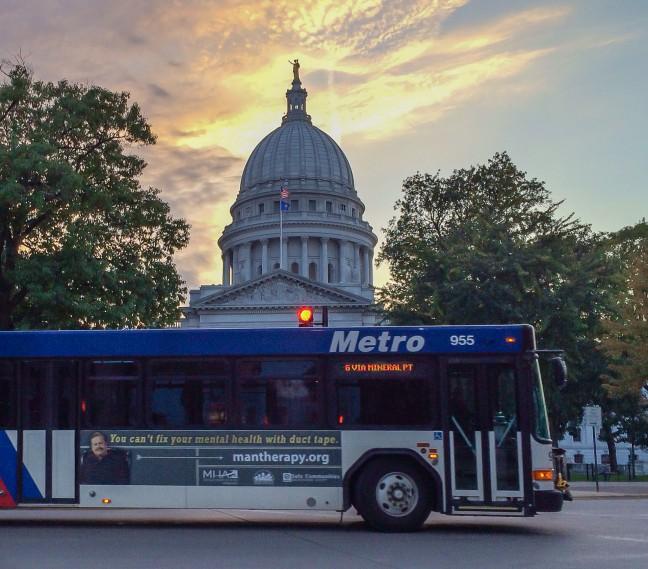Madison’s Metro lines are changing June 11 as the city prepares for its full transition to the Bus Rapid Transit System in 2024, Metro Transit Marketing Manager Mick Rusch said.
In an attempt to improve the bus system, the Metro lines will see a big adjustment in the next month. While the University of Wisconsin bus routes will remain relatively unchanged, all other routes have been redesigned to improve travel times and decrease the amount of bus transfers users need to make, Rusch said.
Census information revealed that people of color typically live on the outskirts of Madison, making their trips into the downtown area long and difficult due to transferring buses and long waits in between buses at certain stops, Rusch said. Because of this, the Metro system began looking into a way to refine the entire system.
The new and improved routes should fix the transfer issue and allow riders to get across town in one bus ride, Rusch said.
“We haven’t had a new route redesigned since 1998, to be honest, and we’ve had concerns through the years that people of color have to transfer more and that their trips are longer, especially on the far reaches of town,” Rusch said. “So we are addressing those concerns and one other big thing is that we are getting routes ready for our bus rapid transit system, which is coming next year.”
Aside from the bus routes that service UW — routes 80 through 84 — all other routes are subject to change, including switching the numbered routes to lettered routes. While there may be fewer routes than previously, the efficiency of the buses through these other routes will increase greatly, Rusch said.
Since the pandemic, the buses have been running at about 85% in terms of service. The change in routes will allow the bus system to revert back to its full servicing, last seen in 2019, Rusch said.
This is because the same amount of buses that currently go through all 65 routes will be switched over to only 20 routes, thus increasing the frequency of buses at stops throughout downtown.
“There’s going to be more buses on less routes,” Rusch said. “It’ll just operate more frequently. So it won’t be like ‘Oh, I miss my bus. I have to wait another half hour.’ There’s gonna be another bus that will be coming by more quickly. They’re going to be operating on more of the same route on a frequent basis rather than spreading out to all those 60 different routes.”
Additionally, the location of bus stops will change with this transition. There are 1,100 stops that will remain in their current locations, 500 stops will be removed from dense neighborhoods and 200 new stops will be added on major streets with lots of foot traffic, Rusch said.
While there has been concern from outlying neighborhoods regarding a further walk to bus stops, the new stops will have more frequent operation of the buses, allowing more options to ride downtown in a quicker fashion, Rusch said.
This change will allow the city to prepare for the full transition to the Bus Rapid Transit System, with the soon-to-be “Route A” being the first route to make the switch in 2024, Rusch said. In addition to this future change, the Metro Transit System has purchased 60-foot accordion-style, all-electric buses, larger than the current 40-foot buses, to allow more people to ride in one bus. These new buses will be introduced with the rapid transit system in 2024.
During the redesign in June, there will be “Metro Ride Guides” to point people in the right direction of stops, with answers to questions regarding the new system and which buses to take for certain destinations. These guides will also be present in the fall when the bulk of students at UW begin returning to campus, Rusch said.
The Metro Transit System has more information on its website, which includes the finalized routes and schedules of the new transit system. Additionally, riders can use the transit app now to plan any trips they might have in the future using the improved metro lines. The trip planning capability on Google will be available around May 14, Rusch said.
For more information regarding the new Metro lines, visit mymetrobus.com, call (608) 266-4466 or email mymetrobus@cityofmadison.com.


